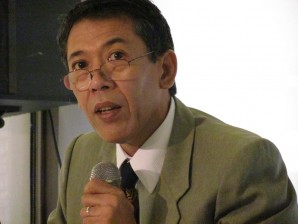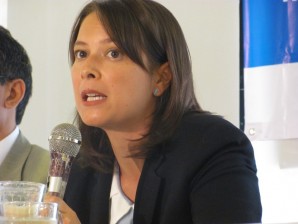Aquino fails to curb rights abuses – Human Rights Watch

Free Legal Assistance Group (FLAG) chairman, Jose Manuel Diokno, said that the Philippines' slow justice system was partly to blame for its poor human rights record.
MANILA, Philippines – The government has not been able to improve the human rights situation of the country since 2008 when it was last reviewed by the United Nations (UN), Human Rights Watch said Monday.
“The administration of President Benigno Aquino III has failed to take significant measures to prosecute members of the military, police and militias implicated in extrajudicial killings, torture, and enforced disappearances,” Human Rights Watch said in a statement released Monday during a press conference.
Human Rights Watch called on the United Nations (UN) to pressure the Philippine government to “ensure accountability for serious human rights abuses,” at the upcoming Universal Periodic Review (UPR) on May 29, 2012.
The UPR is a periodic review conducted every four years by the UN Human Rights Council which is composed of UN member countries.
The Philippines received 17 recommendations ranging from “improving gender rights to eliminating extrajudicial killings,” the first time it was reviewed in 2008.
Article continues after this advertisement“The Philippines accepted 11 of these recommendations, including one ‘to completely eliminate torture and extrajudicial killings’ and ‘to intensify its efforts to carry out investigations and prosecutions in extrajudicial killings and punish those responsible’,” Human Rights Watch said.
Article continues after this advertisementThe government said in a report to the UPR that it has fulfilled its commitment. But Human Rights Watch said that it has failed to “investigate, arrest, and prosecute those responsible for abuses.”
Poor Justice System
One factor that was making it hard for the government to improve on the human rights situation was the country’s poor and slow justice system, Jose Manuel Diokno, Chairman of Free-Legal Assistance Group (FLAG), said.
He cited two human rights cases that have been languishing in the courts: Aberca versus General Ver that began in 1983 and up to now has not yet been final and the Ortigas Rubout Case which took seven years before the Ombudsman decided to begin preliminary investigations.
“I chose these two cases because they signify the situation that our criminal justice system is in, they signify impunity [and] they give a concrete face to that,” Diokno said.
He said there was a “breakdown in law enforcement, prosecution, and the courts.”
The courts were known for “undue delay” with cases lasting 15 to 20 years, Diokno said. He added that there was a vacancy rate of 26.9 percent among the trial judges.
“It is no wonder that we cannot address the number of cases that’s why we have such clogged dockets, that’s why we have delay,” Diokno added.
Other problems of the courts include “a highly politicized appointment process in the judiciary,” and incompatible court rules that are based on a jury system, Diokno said.
Grilling Philippines
Elaine Pearson, Deputy Director, Asia Division, said that she expects the Philippine will be “grilled” in the upcoming UPR.
“I really predict this time in Geneva at the Human Right Council, there’s going to be quite a grilling of the Philippines about what progress has been made on human rights and where

Human Rights Watch Asia Deputy Director, Elaine Pearson, expects that the Philippines will be grilled in the upcoming Universal Periodic Review this May 29, 2012 by the UN Human Rights Council.
challenges remain,” Pearson said.
She added that the Philippines was among the first batch of countries that were reviewed and allowed to “get off lightly” with just 17 recommendations.
“We’ve seen this mechanism become much more rigorous” over the last four years with some countries getting “up to a hundred recommendations”, Pearson said.
She added that there have been some progress in the human rights record of the Philippines such as the passing of the Anti-torture law in 2009 and the Philippines leading role in protecting Overseas Filipino Workers (OFWs).
“[Aquino’s] government really hasn’t delivered in addressing impunity for serious human rights violations. Extrajudicial killings and disappearances of leftist activists continue. And the government has really failed to address involvement by security forces such as police and the military,” Pearson said.
The UPR will be webcast live on Tuesday May 29, 2012 from 3 p.m. to 6:30 p.m. Manila time.